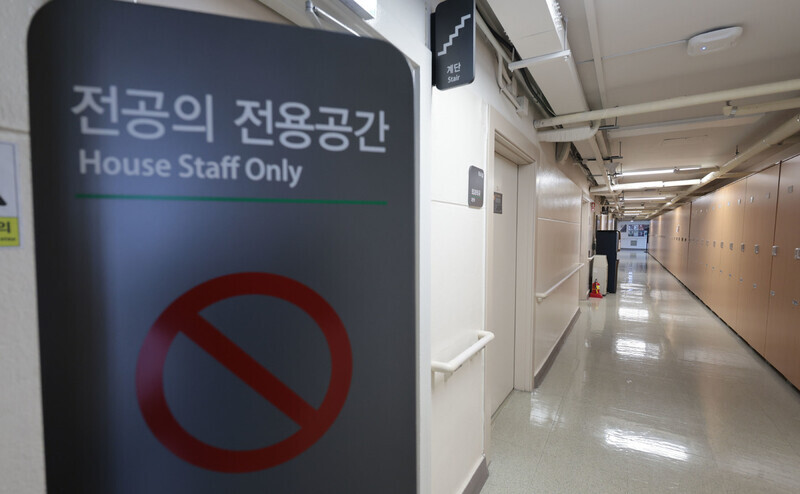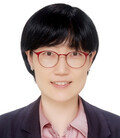hankyoreh
Links to other country sites 다른 나라 사이트 링크
[Column] What’s really motivating Korea’s young doctors to walk off the job?


By Hwang Bo-yon, editorial writer
“Among all students who took the college entrance exam nationwide, the top 3,058 make it into medical school. If we increase that quota to 5,058, some say that will allow subpar students into our medical schools. Some are even talking about creating a separate class for the original 3,058 who made it before government interference. We’d have our own separate alumni community and reunions.”
It’s been over three weeks since medical residents and interns have left their posts to protest the government’s campaign to increase the medical school admissions cap. An anonymous resident gave me an inside look at the rumblings within the medical community. The mood is tense. In 1970, when high schools around the country underwent national standardization, some graduates of the old system decided to form their own, exclusive alumni associations. But isn’t this 2024, nearly half a century later? The resident’s words gave me a sense of deja vu. We went from “doctors who gave it their all to be at the top of the class” to “the people don’t want doctors who were 20th to 30th in their class.” Classic condescension toward public hospitals and the provinces.
This sense of entitlement and exclusivity of the medical community offers a hint to understanding the current debacle involving residents and interns, which is turning into a war of attrition. Around 1,200 residents and interns (93% of all trainee doctors) at 100 teaching hospitals nationwide left their posts on Feb. 20, and they haven’t been back since. The cause was a government policy that would increase the annual medical school admissions cap by 2,000. At first glance, the average citizen finds the situation difficult to grasp.
The sight of doctors going on strike — leaving patients in the lurch — to protest an increase in the number of medical school students is rare in any part of the world. To make matters worse, ERs and critical care centers are no exception to this walkout. No willingness to negotiate with the government or even a gesture of ultimatum. Choosing to put patients in danger by exploiting them as leverage, the trainee doctors simply up and left — not even a word of apology to the colleagues who have been left to deal with the ensuing chaos.
The detailed demands for the government to “completely and unconditionally abandon its plans to increase the medical school admissions cap” weren’t drawn up and posted online until after the strikes started. And still, they refuse to even come to the table for negotiations. They’re basically just making demands and waiting for complete submission. That’s how a toddler negotiates.
The doctors have adopted a sort of mantra in their resistance to the state: “The government cannot defeat doctors.” This attitude is deeply internalized among doctors — even the young ones. Around 37.8% of essential and emergency medical personnel at the country’s top hospitals are residents and interns. The healthcare system’s pathological reliance on the labor of residents and interns — who are essentially trainees — is helplessly exposed every time we see the residents and interns go on strike: The hospitals essentially cease to function, and patients find themselves hostage in a larger situation they are powerless to influence. The government pushes through a policy. Residents and interns leave their posts. A medical vacuum forms, and patients suffer. The government abandons its policy. This sort of vicious cycle has repeated itself for the past 20 years.
South Korea’s medical education is an apprenticeship system, a closed ecosystem where the senior doctors and medical professors exercise inordinate influence, and where the camaraderie among doctors is unsurpassed. When residents and interns rebel by refusing to treat their patients, the senior doctors and professors cheer them on instead of scolding them.
Open ballots and blacklists are some ways that cut off alternative voices and opinions at the start. Trainee doctors went on strike in 2020 to protest a proposed increase in medical school admission by the previous administration, and they suffered no consequences from their seniors and professors. Residents and interns who were reported for disobeying government orders to return to work, doctors who refused to take the national medical exam while demanding a complete and formal withdrawal of the state’s policy initiative — even after the state was already on its knees. They all got a pass.
Naturally, an administration that suddenly announces a plan to increase the medical school admissions cap by 2,000 students — two months before the general election — isn’t to be applauded. Everybody can see that it’s a ploy to muster up approval and sway votes. Although the administration claims that they have met with the Korean Medical Association on 28 occasions in the past year, the whopping number of 2,000 was much greater than original expectations, and wasn’t even mentioned until recently. Some medical professors and experts have suggested a compromise that falls between 500 and 1,000, but it remains to be seen if their proposal will come to fruition. In the end, the heart of the problem is not in the numbers.
Do people really think the doctors wouldn’t have gone on strike if the number were 500? Doctors keep talking about the “data” when it comes to government policy, but they refuse to acknowledge data from the Korea Development Institute regarding the country’s national shortage of doctors and key medical personnel. Medical professors at Seoul National University have made the flabbergasting suggestion that we outsource the research and analysis to a “reliable overseas institute.” Is there any scientific data that the doctors would be willing to accept?
They keep insisting there isn’t a shortage of doctors. There are no considerations of medical shortages resulting from an aging society and the number of doctors heading into retirement. None of it is reasonable. The medical field is known for its asymmetry of available information, even among specialized fields. Doctors hold the ultimate authority over hospital decisions that affect the lives of patients. One can’t help but wonder if they want to apply this same monopoly to control policy decisions.
Dumbfounded by the doctors’ resistance, the government is digging its heels in. They keep reiterating increases in the number of medical specialists in university hospitals, increases in medical professors at public universities, and the efficient allocation of medical resources to prevent patient bottlenecks. Before accusing the administration of ulterior political motives, perhaps we should also call on doctors to revise their radical opinions. Residents and interns who have been run ragged in a system of 80- to 100-hour work weeks are remaining silent about the state’s plans to increase the number of medical specialists? It doesn’t make sense. Both the state and the medical community agree on the principle of sending doctors where they’re needed the most.
The government’s stopgap measures like giving interns and residents who focus on essential fields like pediatrics an extra 1 million won a month in training stipends will do little to solve the structural problem of doctors hanging out their own shingle and raking in easy money with treatments not covered by state insurance.
This isn’t an issue that can be solved with rage quitting after not getting what you want. Only by regaining composure will trainee doctors be able to dispel suspicions that their collective action stemmed from concerns about their future earnings more than anything else.
Please direct questions or comments to [english@hani.co.kr]

Editorial・opinion
![[Column] Season 2 of special prosecutor probe may be coming to Korea soon [Column] Season 2 of special prosecutor probe may be coming to Korea soon](https://flexible.img.hani.co.kr/flexible/normal/500/300/imgdb/original/2024/0426/3317141030699447.jpg) [Column] Season 2 of special prosecutor probe may be coming to Korea soon
[Column] Season 2 of special prosecutor probe may be coming to Korea soon![[Column] Park Geun-hye déjà vu in Yoon Suk-yeol [Column] Park Geun-hye déjà vu in Yoon Suk-yeol](https://flexible.img.hani.co.kr/flexible/normal/500/300/imgdb/original/2024/0424/651713945113788.jpg) [Column] Park Geun-hye déjà vu in Yoon Suk-yeol
[Column] Park Geun-hye déjà vu in Yoon Suk-yeol- [Editorial] New weight of N. Korea’s nuclear threats makes dialogue all the more urgent
- [Guest essay] The real reason Korea’s new right wants to dub Rhee a founding father
- [Column] ‘Choson’: Is it time we start referring to N. Korea in its own terms?
- [Editorial] Japan’s rewriting of history with Korea has gone too far
- [Column] The president’s questionable capacity for dialogue
- [Column] Are chaebol firms just pizza pies for families to divvy up as they please?
- [Column] Has Korea, too, crossed the Rubicon on China?
- [Correspondent’s column] In Japan’s alliance with US, echoes of its past alliances with UK
Most viewed articles
- 1‘We must say no’: Seoul defense chief on Korean, USFK involvement in hypothetical Taiwan crisis
- 2Is Japan about to snatch control of Line messenger from Korea’s Naver?
- 3[Editorial] Korea’s surprise Q1 growth requires objective assessment, not blind fanfare
- 4Division commander ordered troops to enter raging flood waters before Marine died, survivor says
- 5No good, very bad game for Korea puts it out of Olympics for first time since 1988
- 6Korea’s 1.3% growth in Q1 signals ‘textbook’ return to growth, says government
- 7[Reportage] On US campuses, student risk arrest as they call for divestment from Israel
- 8N. Korean delegation’s trip to Iran shows how Pyongyang is leveraging ties with Moscow
- 9Flying “new right” flag, Korea’s Yoon Suk-yeol charges toward ideological rule
- 10[Column] Park Geun-hye déjà vu in Yoon Suk-yeol